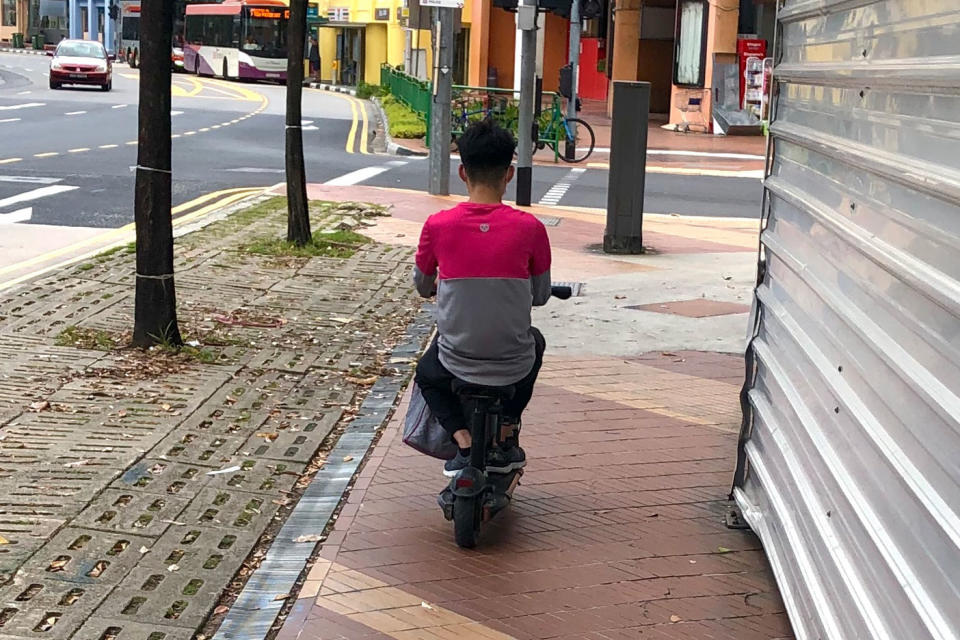Ban on all PMDs on footpaths to kick in on 1 April: Janil Puthucheary

SINGAPORE — With accidents on footpaths involving personal mobility devices (PMDs) falling by 52 per cent since e-scooters were banned last November, Singapore will be banning all motorised PMDs on footpaths from 1 April.
This wider restriction will include devices such as hoverboards and electric skateboards, but will exclude personal mobility aids used by people with walking difficulties, such as motorised wheelchairs.
Those caught breaking the rules can be fined up to $2,000 and/or jailed for up to three months for a first offence. Repeat offenders face fines of up to $5,000 and/or jail terms of up to six months.
Sentiments towards public path safety ‘improved’
The changes were confirmed after Parliament passed the Active Mobility (Amendment) Bill and Shared Mobility Enterprises (Control and Licensing) Bill in Parliament on Tuesday (4 February).
In passing the two Bills, Senior Minister of State for Transport Janil Puthucheary acknowledged that the expanded ban will cause a “connectivity loss” for motorised PMD users.
Nonetheless, he noted that, besides the 52-per-cent drop in footpath accidents, sentiments towards public path safety have improved`.
“We are ramping up our cycling path infrastructure building plans, so that Singaporeans can continue to benefit from active mobility devices. We will announce more about these infrastructure plans during the Committee of Supply debate,” he added.
Minimum riding age, inspection regime, theory test
Besides the wider PMD ban, there are other regulatory measures that are set to kick in from April until the first half of 2021. Some of these measures were recommended by the Active Mobility Advisory Panel in September 2019, following a fatal collision involving an e-scooter rider and an elderly cyclist, and were accepted by the government in December.
From the second half of this year, there will be a minimum riding age for motorised PMDs, starting with e-scooter riders. Those under the age of 16 will not be allowed to ride e-scooters on cycling paths unless under the supervision of an adult over 21 years old.
Around the same time, the government will also be banning the usage of mobile phones and other mobile communication devices while riding mobility vehicles on footpaths.
“A person who is holding and using a mobile communication device may be distracted, and may not have both hands on handlebars or steering wheels, both of which affect their ability to effectively control the device or vehicle when it is moving,” Puthucheary said.
From April, there will be a mandatory inspection regime that will require all e-scooters here to go for inspections every two years.
The Land Transport Authority will be rostering e-scooters that are already registered and declared as UL2272-certified for inspections. It will also periodically call up certified and registered e-scooters for re-inspections every two years to ensure that they remain compliant and are not illegally modified.
Also, from the first half of 2021, e-scooter and power-assisted bicycle (PAB) riders will need to pass a theory test before they are allowed to use those PMDs. Those who successfully complete the required test will be issued a competency test certificate.
Tighter regulations for businesses
Businesses and retailers will also be subjected to tighter regulatory measures. Retailers will be required to send e-scooters for inspection to certify that the devices comply with the prescribed criteria, before they are allowed to register, display, advertise or sell the e-scooters.
The penalty for selling a non-compliant PMD will also be raised for retailers – from a fine of up to $5,000 and/or a jail term of up to three months to $20,000 fine and/or 24 months’ imprisonment.
LTA’s ability to enforce against illegal modifications will also be increased to include all modification activities, whether or not they were undertaken in the course of business. This means that illegal modifications for devices meant for personal use or free modifications will also be penalised.
Heavier punishments for errant riders
Puthucheary revealed that LTA’s enforcement officers detected about 4,900 offences by errant individual PMD riders in 2019. “This is not acceptable,” he said, even as he acknowledged that most device users are law-abiding and ride responsibly.
To send a stronger deterrent message to errant riders, the maximum penalties for certain offences will be increased. For example, the penalty for a first-time offender caught speeding on public paths will be doubled from $1,000 and/or three months’ imprisonment to $2,000 and/or six months’ imprisonment.
“The active mobility landscape will continue to evolve, and our regulatory framework must similarly adapt. We must continue to adjust our regulatory approach to keep pace with technological and market developments. This is a long-term effort,” Puthucheary said.
Related stories:
E-scooters banned from Singapore footpaths from 5 November
E-scooter users must be over 16, pass theory test to ride on cycling paths
65-year-old woman involved in e-scooter accident in Bedok North dies


